Few people really talk about the original Diary of a Wimpy Kid film trilogy. Although their impact on pop culture in the form of memes and incessant pining for this boy is seismic, you’ll be hard pressed to find any honest-to-god analyses of them. It appears those in my generation, somewhere between Millennials and Gen Z, treat them as a joke, or “surprisingly decent” adaptations at best. I deem this oversight wholly unfair, as they are just as worthy of proper analysis as any other series of films.
In 2021, Valentine’s Day was pretty crummy for me, so I decided to watch Diary of a Wimpy Kid: Dog Days in hopes of cheering myself up. I had considered it to be a personal favorite film for some time, and I was delighted to discover it still was (and is). From that day onward, I re-watched the series backwards, then forwards, then re-read the initial four books the movies were based on, discovering that my 12-year-old self was right: the movies are better.
I think this trilogy is a collection of some of the best adolescent dramedies of the last decade. It’s been a great deal of fun mulling over them and picking apart all the reasons why they work so well, and I hope I can succeed in conveying those reasons here.
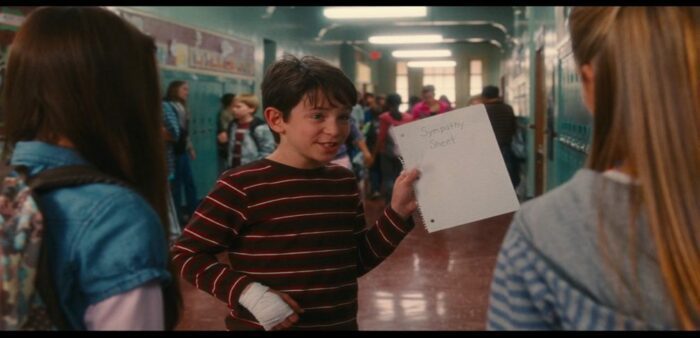
The Books
Before I start, I want to examine the books for contrast. The series is formatted in a way that makes it easy to breeze right on through, which is obviously by design. They don’t exactly have a standard story structure; they are literally a middle schooler recounting his day-to-day life. Each book has its own plot or central theme, but it’s all mundane and kind of random. It is an extremely character-driven series, and I mean “character” as in singular. The only point-of-view we get is that of Greg Heffley, and thus we only get his interpretations of his surroundings.
In the first book, Diary of a Wimpy Kid, our first impression of Greg is that he sees himself as an underdog and is ludicrously self-absorbed. He is obsessive about his middle school hierarchy, and desires to be popular. The rest of the book consists of him illustrating how his life sucks, his schemes to try and achieve relevancy, and him insulting just about all of his peers. It’s a bit like an edgy Charlie Brown (which the score of the film adaptations accentuates in its similarity to the iconic Peanuts theme).
Greg’s treatment of Rowley Jefferson, his supposed “best friend”, is especially notable. While reading each book, I felt Rowley wasn’t so much a character, but a tool for Greg to make himself seem smarter. This is even distinguishable in the way Greg draws him; open-mouthed, dopey, and kind of pitiful. The first time Greg properly introduces him, he refers to him as nothing short of expendable (“Rowley is technically my best friend, but that is definitely subject to change” [“Diary of a Wimpy Kid”, page 17]).
His other relationships are just as bad. The second book, Rodrick Rules, is as jam-packed with comic levels of misery as its predecessor. Greg continues to be a jackass, and his brother, Rodrick, does nothing but be a pest toward him. Their relationship is only poor throughout the book, making for more of the same narrative; Greg’s life sucks, everyone around him sucks, and he sucks. At the end of the book, Greg slaps a positive anecdote in there (“. . .even though Rodrick can be a huge jerk sometimes, he IS my brother” [p. 217]) and helps the eldest child with a school project, but this does absolutely nothing to convince me that there is any real care between them. They scrap and they jest, but there is no love in their punches.
And then there’s the third book, The Last Straw, wherein the focus is mostly on Greg’s relationship with his father, Frank. Greg writes a lot about pining for his father’s acceptance, which the man just won’t give to him no matter what he does. At first, you could write it off as Greg simply trying to get his dad off his back, but the extent to which he goes to get his attention, and the way he writes about it, makes it hard to deny that he genuinely wants his father’s love. But once again, the book follows the series’ strict “everything is bad” rule, and nothing ever improves, and in fact worsens by the end of the fourth book.
And that fourth book (which is the namesake for the third movie), Dog Days, is pretty unremarkable. In my notes post-re-read, I called it “a mix of funny and mundane”. I felt it was the point in the series where things began to get repetitive and was kind of glad I didn’t have to revisit any more. However, there were some gems: there’s a bit where Greg is taken to a hair salon and winds up getting involved in the hairdressers’ gossip and keeps wanting to go back to stay in the loop. Consequentially he also gets very into watching soap operas. It is hilarious, and I cannot believe they didn’t use it in the movies.
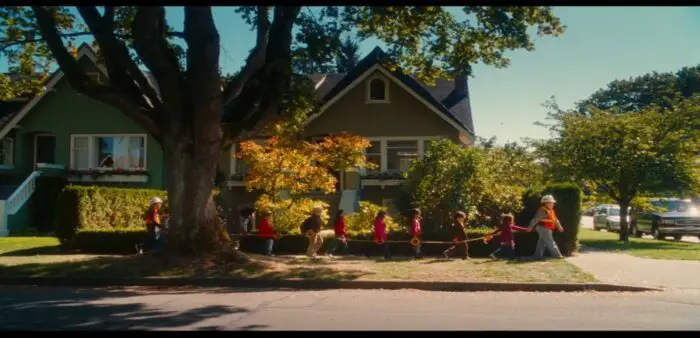
Diary of a Wimpy Kid
In the first film, Greg is still a dick, of course, but nowhere near as severe as he is throughout the book series. The film’s writing injects some humanity into him; he’s shown to actually care about other people, care about Rowley, most importantly. This new portrayal is successful in part because we’re no longer confined to his point of view—we see things he wouldn’t write about in his journal, things as they are happening, things that are the most telling of his true colors.
Going back over the opening scenes, I felt it important to pause and take in Greg’s bedroom. One of the first things I noticed was a reoccurring theme of pirates, which is a typical aesthetic common among young boys. Also important is this exact thing: Greg is a young kid. Now, if the books are anything to go off of, he’s a pretty sophisticated writer for his age, which makes him come off as more sage than most ten-year-olds. But as soon as you step outside of that singular idea of him (his idea of what he’d like to be, but more on that later), and actually see him in his environment, it becomes clear how much of a little baby he actually is. Not to suggest that an interest in pirates is inherently childish, but it serves as a clear symptom here of just how young he is, the remnants of his utmost innocence still decorating his walls (side note: he’s also got a fish tank. I hope to god he’s taking care of those).
Greg makes a statement early on that he agreed to his mother’s suggestion of keeping a journal partly because he wanted to document his life and pass it on to his “fans” when he becomes rich and famous—I’ll unpack this more later. For now, I only want to point out that he is, in fact, considering his future. But what kind of future, exactly, does this ten-year-old who is barely out of the womb of babyhood see? We get a couple of fantasy sequences featuring his face plastered on billboards and magazines; his face as it is presently. He’s still a little kid in these fantasies, one of which is set in Times Square at twilight, but lit in a way that looks utterly fake, emphasizing the blasphemy of the imagery. Greg has no real future vision; hell, we don’t even know what he’s famous for in these idealizations, and I don’t think he does either. These aspirations are about as serious as they are for most kids his age: silly, unattainable, and without any actual comprehension of what “future” even means for them. There’s another daydream sequence wherein he is depicted as an adult, but it’s by a guy who looks absolutely nothing like him and still has his ten-year-old voice. This reminds me of how I imagined my adult self when I was ten; someone who looked nothing like me, some stereotypical copy-paste “adult” who vaguely had my person inhabiting them. What I want you to take away from this is that Greg is an absolute baby, not a conniving mad genius.
With that Times Square scene still fresh, I need to talk about the cinematography. Jack Green helps deliver a vibrant and inviting world full of rich, beautiful color. It’s essentially familiar environments with a bit more intense brightness than what you’d see if you were in the room, but it works to evoke a playful energy. It is a kids’ movie, after all; the sky is bright blue, the sun vivid and promising. It’s a warm, comfortable presentation—even the shadows are lit in a calm blue. In speaking of blue, there is a notable repetition of a unique shade of turquoise that gives the film a cozy, safe feeling.
Back to Greg. His childishness, how hard he tries to be his idea of “sophisticated”, and the way the outside forces against him are framed as incredibly perilous when they’re really such small potatoes brings on a lighthearted and innocent overlay. His anxieties and fears are real and believable, once again accentuating his youth, but at my age, I watch them sympathetically and have a laugh. He has no idea how innocent he really is, and that’s adorable. These movies are cute, dammit!
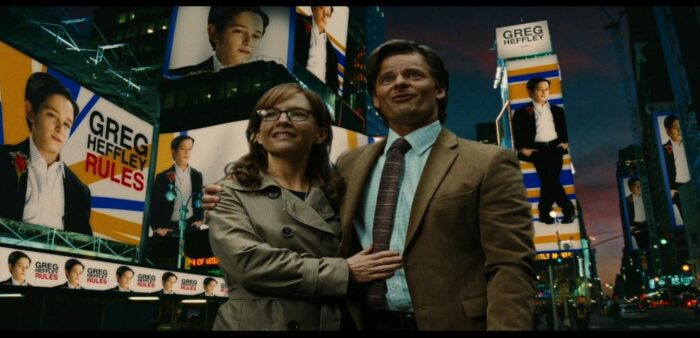
The movie is mostly antics before things start to pile on top of Greg post-accidentally breaking Rowley’s arm. He’s jealous of the attention his best friend is getting, he’s too scared to tell the truth about throwing some little kids into a hole, and he genuinely feels bad about letting Rowley take the fall for it. This pile starts to fall down two thirds of the way through the runtime.
Rowley is unrelentingly sweet, and Greg is the definition of insufferable. There is a moment where Greg realizes this exact reality, when Rowley reveals to him that he’s included Greg in the latest issue of his “Zoo-Wee Mama” comic strip, just after Greg made the conscious decision to let Rowley get kicked off the school’s safety patrol team in his place. We can see in his eyes and hear in his voice that the pile atop his head is starting to fall down (real bang-up job from Zachary Gordon), and in this split second of consciousness, he decides to come clean. But, unfortunately, his head isn’t entirely out of his ass yet, and he officially loses Rowley.
Greg reacts to this new development by lashing out in his journal and expressing disdain toward his ex-best friend, but intermixed with expressions of genuine hurt. The scene that encapsulates this best is the point at which Greg gets Rodrick in trouble with their mother. His first instinct is to dash upstairs to his room, a cheeky grin on his face, to call his best friend. He doesn’t hesitate to dial the number, and Rowley picks up, but not before Greg remembers they’re hardly friends anymore. His face falls, and he hangs up without a word.
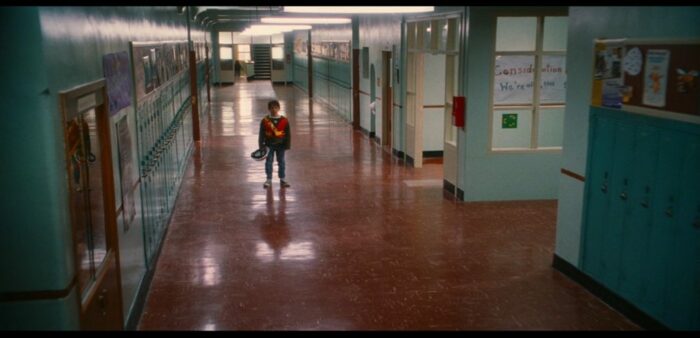
But it’s still a hard thing for Greg to admit his mistake. Towards the end of the movie, he and Rowley get into a physical fight. But as the pair are squabbling, a small pack of teenagers with a grudge against the two appear, and take note of the rancid piece of swiss cheese that has reigned terror upon the middle school for god knows how long. The perfect weapon with which to torture unfortunate children.
In the book, when Rowley is forced to eat the cheese, nobody finds out. The next time it’s mentioned, Greg talks about how difficult it is to not rat on Rowley; he’d gladly do it for some peer points. But in the film, the other kids are there to see the aftermath, and soon realize what Rowley had done. Here, book Greg would have allowed Rowley to take the fall, no question; but movie Greg immediately takes the blame. He goes as far as to pick up the rotten cheese in front of everybody, officially dubbing himself the possessor of The Cheese Touch, in an attempt to reason with the rest of his classmates. But the other middle schoolers shriek and scurry away, the pack of teens are frightened off by the gym coach, and Rowley and Greg are left by themselves.
This scene is huge for Greg. For the entire film, we watch him pine for his peers’ acceptance and demonstrate that he’s not afraid to throw his best friend under the bus to protect himself from trouble. This kid is desperate to maintain appearances and gain the popularity he craves, but in this moment, he literally throws away his social life to save Rowley. He chucks everything he was aiming for in the trash, even vocally professes that it’s all “meaningless”, because he realized that Rowley is more important to him—and Rowley knows this, too. He knows that Greg is selfish and a jerk, and therefore recognizes the gravity of what he’s done. He does care, and he just showed it in bright flashing colors for everyone to see. He’s not going to be perfect, but he’s shown he can learn, and that’s enough.
“. . . When somebody’s worth it, you just have to put yourself out there.”
Before I move on, I want to touch on Chloë Grace Moretz’ character, Angie. She serves as a kind of replacement for the books’ Holly Hills, but doesn’t stick around for either of the sequels. She’s an edgy middle schooler with a quirky fashion sense who reads anti-capitalist poetry (specifically Allen Ginsberg) and sees her peers for the silly lambs they are. She takes delight in watching Greg, someone who is the exact opposite of her, fumble through his quest for relevancy. My question going into the movie for a re-watch was, does she add anything? And I say yes.
I imagine without her, there would be less awareness drawn to the overall message, best delivered in her line: “One day middle school will end, and become high school. And after that, it just becomes life. And all those things you think are important now? Won’t be anymore.” She felt like an anchor keeping the movie on earth and not up Greg’s ass. She’s only in scenes with Greg and/or Rowley, and when she’s there, Greg isn’t the master of his little universe, and it seems like he knows it. He recoils from her, believing her to be social poison, but I think he just wasn’t ready to hear what she had to say. He’s shown to have some awareness that what he’s doing is shallow, and it’s clear he knows that Angie can see it, too, and is likely afraid of confronting that. Of course, he winds up confronting it anyway when he professes the triviality of his peers’ social hierarchy, something for which Angie looks upon him proudly. The pair of them seemed to be on good terms at the end, and I wish she would’ve stuck around for the other movies.
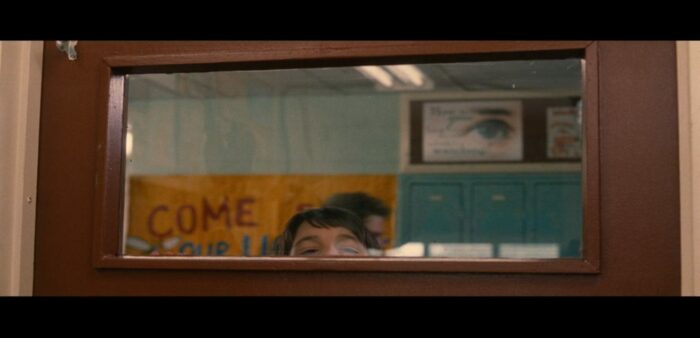
Diary of a Wimpy Kid: Rodrick Rules
In speaking of the other movies, it’s time for Rodrick Rules. Remember that love I said was absent in the book? Well, that is absolutely not the case here. The core of this movie is love, on top of sharp comedy and more of the technical elements that made the first movie so great—Jack Green is at it again with his joyful colors, though there is a notable difference in the use of blue. I said the first movie used that comfy turquoise, but Rodrick Rules opts for a more vibrant, strong, emotional blue. Also notable is that there are less daydream sequences and non-diegetic elements. The movie spends more time in reality, any interruptions usually coming in the form of the brief animated comic-style sequences. The presentation is maturing alongside Greg.
As the title would suggest, this film spends a significant amount of time with Greg’s older brother. At this point he’s no stranger to the audience, having served as a minor pest and source of comedy in the previous film. But this sequel expands on his character, lets us actually get to know him—more importantly, get to know his and Greg’s relationship. They have your run-of-the-mill sibling dynamic; big brother bullies the little brother, who would sell big brother to the devil for one corn chip. Mom wants them to get along, so she bribes them to spend time together. Silliness ensues.
Now, I said the love wasn’t absent, but at this point in the film we’re merely on the tolerance level of “love and tolerance”. The pair aren’t quite as apathetic toward each other as they are in the book, but they’re still not each other’s fan. But with the playful tone the movie maintains as per its predecessor, their rocky relationship feels more like tumbled stones than jagged edges. They don’t hate each other; they’re just lost in the thick of that rivalry and haven’t sparked an interest in becoming friends.
There’s a detectable shift at about one third of the way through, when Greg is helping Rodrick set up his impromptu house party. He pokes fun at his big brother, saying, “Your party [had] better be good”. When Rodrick responds, “Our party, little bro,” Greg breathes a laugh and grins; he’s genuinely excited to be involved in something Rodrick is doing. This implies an underlying desire for his big brother’s acceptance, which makes perfect sense, as it’s common, average, for little siblings to want their older siblings’ approval, whether they’re conscious of it or not. There’s generally a lot of Greg not being aware of everything he feels.
But, of course, Rodrick doesn’t actually intend to let Greg play with the big kids. He locks the youngster in their basement, a situation that Greg manages to weave himself out of and cements himself a place at the party. Despite Rodrick’s lack of enthusiasm, the pair wind up enjoying each other’s company. They even help each other clean up the following morning’s apocalyptic mess with one hour to spare before their parents return home. From that point onward, the pair grow closer, with Rodrick even giving Greg friendly life advice and “helping” him with school projects (he gives Greg one of his old [very terrible] papers to turn in as his own, mistakenly believing that their father wrote it). It grows into an endearing and sweet bond.
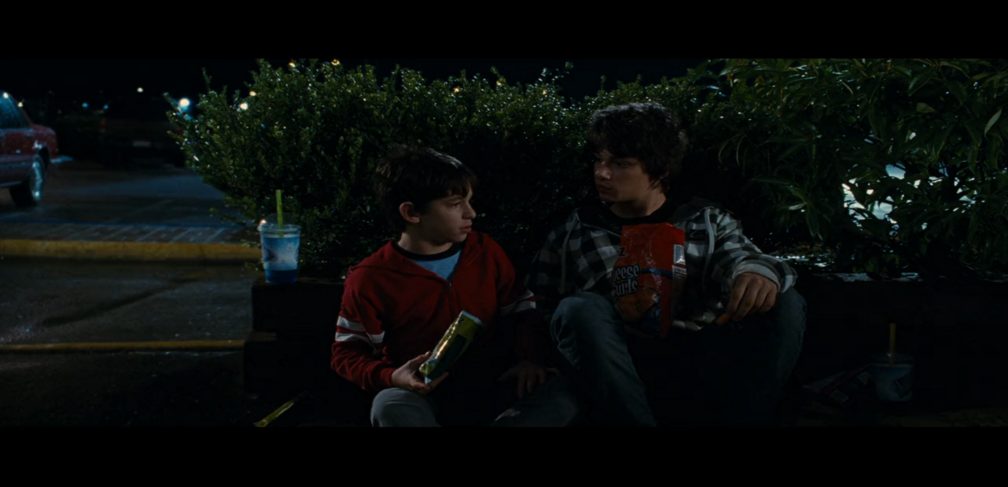
There’s a stronger theme of inadequacy here than in the first film. There’s a new girl in town by the name of Holly Hills (I guess, in the movies’ case, she’s Angie’s replacement), and Greg’s got it bad for her. But his classmate, Chirag, insists that a girl like her would never be seen with guys like them. Greg doesn’t seem to care, but his morale takes a huge blow when, in the aftermath of a prank gone wrong (gone right, in Chirag’s case), Holly calls him “Fregley” when passing by in the school hall—the name of the least popular kid in school. Now, Greg has to face that he might not have a shot with her after all; he might be just as undesirable as Chirag suggests. Maybe he’s flawed.
Luckily, this takes place when he and Rodrick are on good terms, and the eldest Heffley decides to treat the middle child to a fun night out. My favorite part of this sequence is when the pair are sitting behind some bushes in a gas station parking lot, and Greg confesses who Holly mistook him for. At first, Rodrick starts to laugh (because apparently Fregley is notorious enough to be well-known amongst high schoolers as well), but then remembers that he actually likes his little brother, and switches to a supportive, reassuring role. This shows that their positive relationship is still very new to them, but they’re actively putting in effort to be a force of good in each other’s life.
The pair’s dynamic is so pleasant to watch that, when it falls apart, it holds weight. Rodrick eventually finds out that Greg broke his promise to not tell their mother about the party, prompting the oldest to abandon their friendship. It worsens still when, as a punishment, their mother prevents Rodrick from performing with his rock band in their town’s upcoming talent show. Rodrick fully blames Greg, placing their relationship at, as Greg puts it, “an all-time low”. He’s mainly crestfallen at the reignition of his brother’s bullying, but it’s also clear that he’s sad at the loss of the real love and care they were kindling.
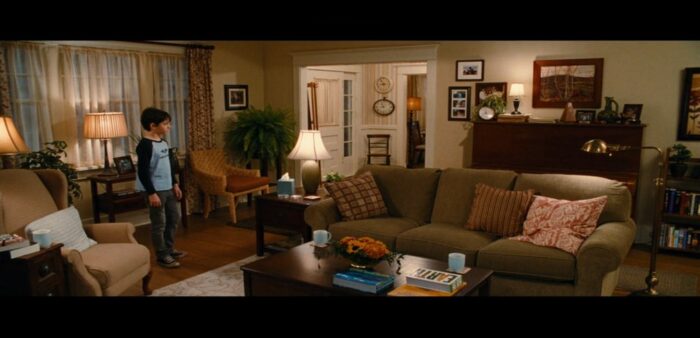
At the end of the movie, Greg showcases his development in essentially the same way as in the previous film. When he finds out Rodrick’s band has replaced him and are going to perform in the talent show without him, he strikes a deal with his mom; she’ll revoke the punishment and let Rodrick perform if Greg goes on stage with Rowley in an embarrassing magic act. He’s willing to put on an impromptu performance in front of his entire town, including Holly, potentially humiliate himself, all so his brother can put on the show of his dreams. He’s showing again that the positive relationships in his life ultimately mean more to him than social status.
Not only is the magic show hilarious and ingeniously written, but it ends in a smashing success, a connection made with Holly, and a band-aid on the brothers’ friendship. Rodrick gets to perform with Löded Diper (that’s the name of his band, and no, it is never explained in the movies), which is also a success, just not for the reasons they’d hope—but still. It’s an impeccable ending sequence that leaves Greg with brighter skies ahead.
“We killed—and I didn’t have to die!”
Before we reach the final film, I want to take a moment to talk about Rodrick. I noted in the early stages of examining Rodrick Rules that he is honestly just as “wimpy” as Greg is. It’s implied that he’s about as popular as his little brother, maybe even less so. The main difference is that he’s in a stronger state of denial, best summarized in his line, “Tons of girls act like they’re not into me, but they are. I know they are”. He’s definitely not as smart as Greg (the guy is seen trying to scrub off hours-old eyeliner with DRY cotton pads), however he is just as, if not more crafty—he’s got street smarts.
While he still leans in the direction of being comic relief, and returns to that as his primary role in Dog Days, there’s still something endearing about him; it’s gotta be more than just his looks that have all these teen and young adult fans head over heels for him, right? His best elements are his passion for his craft (drumming) and his foolishness. We’ve already been over how he’s not too bright, so I’ll expand on his aspirations. The joke is supposed to be that he’s a terrible drummer in a terrible rock band, which would work if either of those things were actually true. Yes, Löded Diper genuinely has good music and Rodrick is a genuinely good drummer. He’s clearly dedicated to his craft and has a good repour with his bandmates, whom we are left to assume are just friends from school. These are admirable qualities that make the character fun to watch and engage with.
I think what I failed to properly examine the last couple of times I watched Rodrick Rules is the fact that he’s as much of a kid as Greg is. He’s naïve, adjusting to the world around him just as much as his little brother. He’s more familiar with how the world works, but is still fumbling through it all. To expand, during the scene in which he and Greg are delivered their punishments, his reaction to being banned from the talent show is honestly heartbreaking. He was excited and hopeful that the show would get Löded Diper some recognition, and having that taken away nearly brings him to tears (it’s one of Devon Bostick’s best performances in the trilogy). This reminds me of my analysis on Greg in movie one. Rodrick’s feelings are completely understandable and valid, but it’s small potatoes; it’s not like this is the only chance he’ll ever have to make it in music. But he’s still an adolescent with big feelings in a world much bigger than he can comprehend, and because of that, it feels like live or die. I can remember being in positions much like that as a teen, and I really feel for the guy.
One of this trilogy’s greatest strengths is its ability to write and portray emotional moments in child and teen characters. As an adult viewer, I know they’re gonna be just fine, because, to paraphrase Angie, everything that they think is apocalyptically important in that moment will feel like nothing in a few years. But because they’re immature youngsters who are genuinely trying their absolute best to make it through every day, it sucks to see them sad, and as a result, it feels great seeing them happy. And that’s on good writing!
Also, unrelated, but Fran Kranz is in this movie, too. Mr. Kranz, if you’re reading this, congrats on Mass!
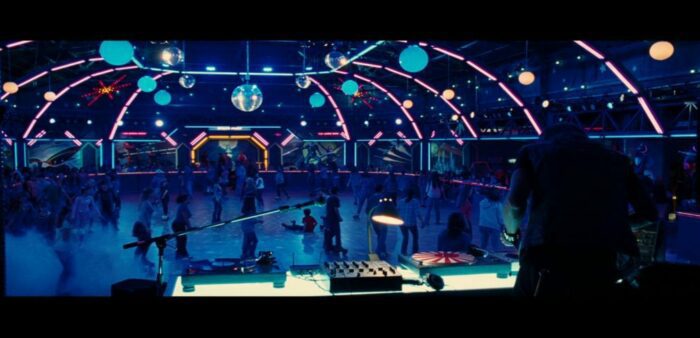
Diary of a Wimpy Kid: Dog Days
Dog Days is, and may always be my favorite. While I suppose all of these movies could be considered “coming of age” films, this one really leans into that. Our characters are growing up, voices dropping and bodies contorting into those awkward pre-teen forms, and as per Rodrick Rules, the film matures alongside the characters—there are even fewer daydream sequences, something that further draws focus to Greg’s aging. The cinematography, helmed this time by Anthony B. Richmond (who also shot the original Candyman), is slightly less vibrant, many of the scenes taking on more natural tones. That filter of childlike wonder is fading away, embracing the beauty of the real world. And, if you’re wondering about the blue, yes, there’s more blue themes. It’s a similar shade to what was used in the first movie, but it’s contrast with other colors (notably yellow and green) that make it look more like a calm, light, summer sky blue—lest we forget, this is also a summer-themed movie filled with pools, vacations, and fleeing the confederacy.
We’re soon made aware of the film’s focus on Greg’s relationship with his father. You may recall this theme from the third book, and it is the soul of this film, but its true weight isn’t immediately obvious. What is immediately obvious is that Greg’s goal this time around is simple: he just wants to have a fun summer—and get closer to Holly (who, notably, is a mirror image of Greg: the middle child with an asshole older sibling and a spoiled younger sibling, except she is a generous and sweet person by nature, even her bright blonde hair contrasting with his dark brown). He’s around twelve or thirteen at this point, and is still stumbling through his life, trying his best with everything he knows how to do. He gets tangled in several webs of his own bulls**t, all of which go down in flaming disaster, planting him in front of the thing he actively avoids for the whole movie: his father.
His main motivation for many of the things he does in Dog Days stems from wanting to please his father for one reason or another. These reasons are usually framed as him wanting to get Frank out of his hair, but through a conversation between Frank and Susan (Greg’s mom) closer to the beginning of the film, we get the seed of his feelings going deeper. Susan reminds the Heffley patriarch of how his own father never paid enough attention to him when he was a child, and urges him to put in more effort to connect with Greg. Neither men are enthusiastic, but Frank recognizes the importance, and Greg needs his father’s acceptance even though he, as usual, doesn’t quite comprehend that.
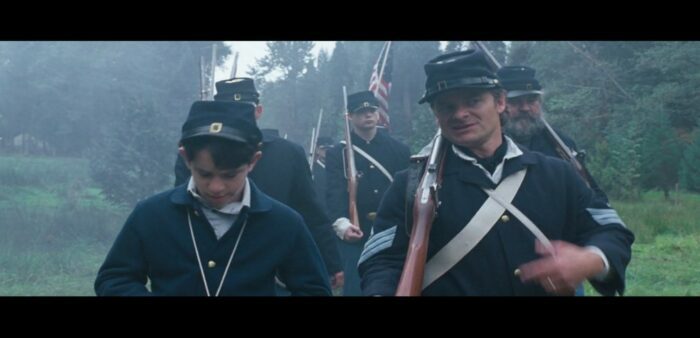
There’s a great contrast moment that gets its beginning at the end of the carnival sequence. Greg gets Rowley in a bit of trouble with his parents, prompting them to say they’re disappointed in their child. He’s super broken up about it, and Greg doesn’t understand, as he comes from a family that is prone to harsher discipline than a simple proclamation of disappointment. Rowley tells him, “You’re used to it”, and he pauses. Such a statement likely causes him to ponder why he gets in trouble enough to be accustomed to punishment; sort of an “am I a bad kid?” moment. It also showcases that how his parents think of him might have a more significant role in his pyramid of needs than he expresses, or that he thought.
We circle back to this theme of parental disappointment closer to the end of the movie. After Frank discovers Greg’s “job” at Rowley’s country club was just a sham, he has to pay a hefty concession fine and take the troublesome boy home. On the drive, he gives Greg the famous “I’m not mad; just disappointed” line, and suddenly, Greg completely understands Rowley. Through his interactions with Frank while he was still under the impression that his son was a “working man”, Greg got a taste of what it felt like to be accepted and embraced by his father. Now that he’s lost that, it stings.
While Greg subsequently tries to please his father mainly in order to avoid being sent to an authoritarian prison-school, our understanding of his true feelings has already been cemented. He’s trying to save his own skin, but he also wants his father’s acceptance—what kid doesn’t when they’re hardly thirteen? So, we get the summer camp sequence wherein Frank takes the role of a counselor in Greg’s troop, which gives the two some time to work things out.
It’s rocky at first, of course, the pair just coming off that break in their bond. But when Greg and his fellow campers overhear the rival troop’s leader talking s**t about Frank, he takes action (the only time in the series Greg’s grand gesture takes place before the finale). He and his friends set several traps, some of which fail, some of which work, but ultimately planting Greg in front of his usual two options: play dumb or own up. There isn’t much hesitation before he decides to take the second option.
Frank responds by suggesting he and Greg split from the forest, and hole up in a nearby motel. While they lay on one of the beds together, a box of pizza between them, Frank confesses he doesn’t actually like camping (a rare thing the two can agree on). He also confesses that he is not going to send Greg to that nasty school, at which the young man is surprised—he still wasn’t convinced he was enough for his dad. Here, Frank delivers one of my favorite lines in the entire trilogy: “You know what my grandpa always used to say? ‘A man who never made a mistake never made anything.’ The trick is to be responsible, and to learn from your mistakes. You can do that.” Put a pin in that one.
Greg doesn’t say anything, but we can tell Frank is striking a chord. Even though Greg is visibly older, he’s still a child, and nowhere is that more apparent than in this scene, where it’s just him and his dad.I think the best way to describe it is that moment from Spider-Man: Into the Spider-Verse that became a meme, the one with Peter B looking quizzical as young Miles Morales watches him intently. It’s a young teen looking at a patriarchal figure as someone important, someone beyond them. These two descriptors are not necessarily true (and often aren’t), but it’s how Greg sees Frank, how a lot of kids see their parents. It feels good to be loved by our parents when we see them like that; it’s how they’re supposed to make us feel.
“You’re a really great kid, Greg. And I’m not just sayin’ that because we’re a lot alike.”
Now, the finale. It doesn’t end in one of Greg’s displays of selflessness; it ends with a joyous romp. Löded Diper performs at Holly’s sister’s birthday party to massive failure in a fabulous scene of madness, and Greg finally solidifies a connection with Holly. It’s not a relationship, but two kids saying, “hey, I like you”, without actually saying it. The pair and Rowley are then seen in Greg’s community pool, shortly thereafter summoned away by the announcement of lunch. The Heffleys are content and sunny, even Rodrick, despite his preceding disastrous display, and it feels like brighter skies are ahead once again. The end credit sequence flips through cast performances in all the previous movies, so you know this is goodbye.
Greg isn’t perfect when his screen time is over. He’s still a bit of a tool, a liar, and has an ego too big for his little self. But we’ve just watched him actively get better for a sum of roughly four and a half hours, and Dog Days’ unspoken promise is that he will continue to do so. Nothing is perfect, but it’s good, and that’s enough.
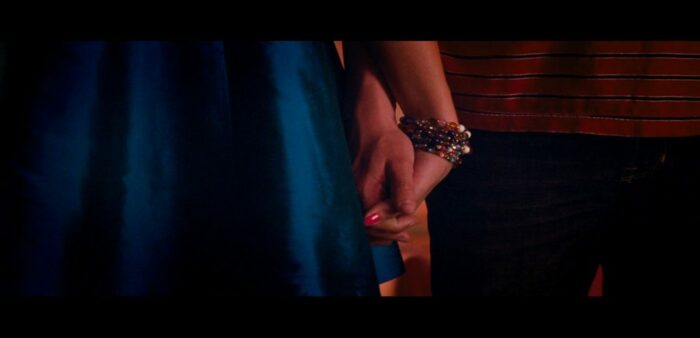
Before I move on to any broader topics, there are a couple of things I want to touch on. First, Susan deserves her own spotlight. She is the one who sets each film’s payoff on its track. I already explained how she did this in Dog Days, so I’ll explain the other two. In Diary of a Wimpy Kid, Greg confides in her about his dilemma, not telling her anything explicit, but explaining enough. She tells him, “It’s our choices that make us who we are” (put a pin in that one, too). As we see in the film, Greg doesn’t act on this advice immediately, but the importance of her words isn’t lost. In Rodrick Rules, Susan doesn’t have a “words of wisdom” moment, but rather a consistent overarching desire to simply see her kids getting along. Sure, she bribes them to spend time together, but nevertheless it is her efforts that bring Greg and Rodrick together.
She doesn’t get an arc with Greg because she doesn’t need one. She already loves him unconditionally and knows how to show that. She tells him what he needs to hear and encourages beneficial changes. You can agree or disagree with some of her parenting tactics, but it is undeniable that she loves her family and takes care to ensure they know it. She’s imperfect, but she cares—like Greg.
Secondly, the cast of these movies was of immense importance in the success of this trilogy. Each and every character, from front-and-center to background, is impeccably cast. Everyone completely embodied their role with just enough realism and zaniness to match the energy of the writing and the environment. I truly feel that this ensemble was a once-in-a-lifetime occurrence wherein everybody was in the right place at the right time; and I have a feeling the producers felt the same. These movies were released back-to-back-to-back, three years in a row. They wanted to get everything they could out of this cast before the youngsters got too old. These people were star-crossed, and if we might examine Dog Days’ credits once again, the cast’s sequence in those is a testament to that. It is lovely.
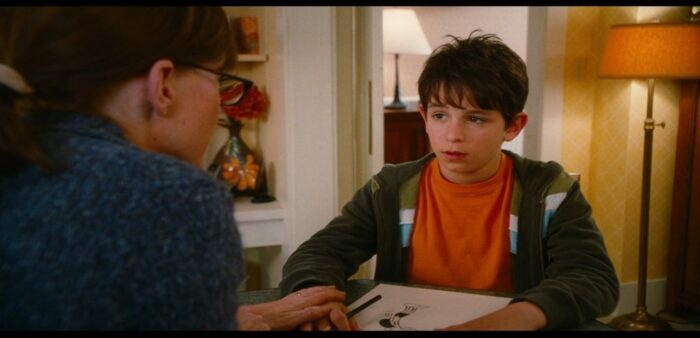
The Books as Companion Pieces
When I was conducting my re-read, I discovered that, even though I believe the films are a better application of the source material’s concept, the books are interesting to think of as companion pieces. You could look at them as being movie Greg’s literal diaries. This reading doesn’t always lend itself to the films, but from some angles, it can tell us a lot about Greg’s character.
First and foremost, he is the ultimate unreliable narrator. The books, them being private journals, are exclusively from his point of view. As an egotistical child, he’s obviously going to portray himself as the protagonist, or “hero”, which makes it difficult to distinguish between exaggerations and reality. For example, he draws himself getting physically attacked by bullies a fair bit, but how often does that actually happen?
I say the journals are “private”, but we must remember that Greg is jotting down his daily activities to share his life’s story with his “future fans”. So, with that in mind, his writing can be interpreted not only as his perspective, but as performative. He’s trying to sell himself as an underdog who is better than everyone else; he is conceptualizing himself. He’s not honest with or about himself or anyone around him in his journals. This reading, to me, makes him even more sympathetic and likable. Because, when you contrast the way he behaves in the films with the way he says he behaves in the books, he seems a lot more like an immature kid who thinks he needs to be a bit of an asshole to get by rather than a full-blown sociopath.
And, yes, while conducting my revisit, I was also considering the “is Greg Heffley a sociopath” question. I had wanted to reexamine the series with that in mind for a while, so this little adventure was as good a time as any. In short, yes, book Greg has a lot of sociopathic or narcissistic tendencies. But since we’re looking at the books from the companion piece perspective, how much of that is true? And even if he does have NPD or some other kind of personality disorder, that doesn’t make him a bad person; that’s not how mental illness works. To take out that pin from a few paragraphs ago, “It’s our choices that make us who we are” (and put that pin right back in there). Greg doesn’t always make the right choices, but when he does, it shows he is learning, and he takes those lessons with him as he ages.
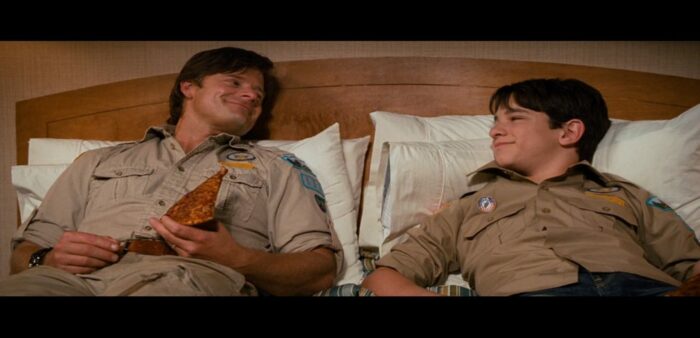
What’s It All Mean?
When we were studying poetry in my creative writing course, we learned about something called “duende”. As an example, my textbook used The Force from the Star Wars franchise; a concept, a constant presence that makes an artist and the audience feel something deep and powerful. It is also akin to mojo, the flow of the work, the feeling of it, what guides us along as we create and engage with it. After learning about this, I wondered: what would happen if we applied duende to film? And why not apply it to Diary of a Wimpy Kid?
The question here is, what delivers that powerful feeling? What’s the thing that makes us go, “this is the what this is about”? Of course, the inherent subjectivity of film makes it hard to mark something within one as a definitive, objective emotional drive, but it also means that each interpretation has validity. So, I’m fully prepared to offer my read, which is that Diary of a Wimpy Kid’s duende lies in its depiction of personal change.
Obviously, I’ve poked at this overarching aspect of the three films, but, to me at least, it feels like there’s even more to it. Greg’s handful of big moments in the film that display his development don’t fundamentally alter him. After he takes the blame for The Cheese, he doesn’t totally stop viewing Rowley as underneath him, but he’s doing it less. After he performs at the talent show, things aren’t completely perfect with Rodrick, but there’s less of a struggle. And after he stands up for his father, their relationship isn’t perfect, but it’s better. Change as it is depicted in the Diary of a Wimpy Kid franchise is meticulous and slight, but full of hope.
It also places a crucial emphasis on Greg’s personal choice to put in the effort to be better. Let’s take that pin out for the last time: “It’s our choices that make us who we are”. Greg’s bad choices could have easily defined him, but he’s shown us with his good ones that that isn’t the case. It can take him a while to get there, but what matters is he gets there. He is actively, repeatedly making the choice to be better, which is one of the hardest things a person can do, and it’s insanely impactful to watch such a young character do that. To take out one last pin: “The trick is to be responsible, and to learn from your mistakes. You can do that.”
It’s these aspects of the films that, for me, deliver that tangible emotional impact, that tell me “this is what this is about”. To define it in words: you might do bad things, and you are not beyond repair. You are not a villain; you can make the choice not to be.
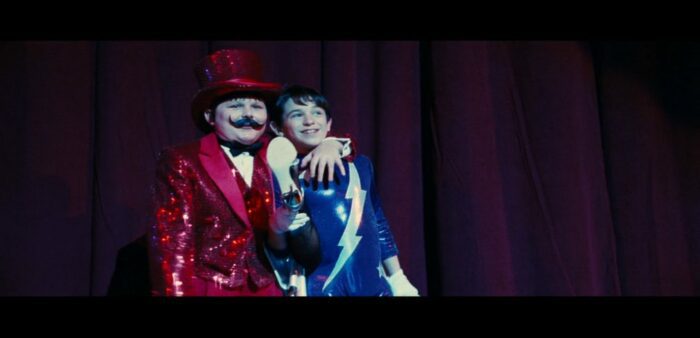
In Conclusion…
This series, books and films, is about Greg’s quest for acceptance. The driving force of the books seems to be that he never achieves it, but in the films, he does—not the kind he actively chases, but that of his family and close friends. The books are all about what he wants; the movies give him what he needs: real love and acceptance.
None of this is to suggest that it’s inherently bad that the books don’t aim for happy endings; they just don’t work for me. Reading about some kid being an asshole and having a comically painful life in various different settings gets stale fast. I’m even a fan of simple pieces of creative media with little to no overarching plot, but Diary of a Wimpy Kid is an exercise in misery that doesn’t make for a very enjoyable read to me.
The films, in contrast, feel lively and joyful. Each character feels like a person rather than an archetype for a bastard child to riff on. Greg isn’t a sociopathic ass; he’s a kid who is learning and growing and doing his best. On their own or with the source material in consideration, these movies are some of the greatest films about youth ever created—honest, innocent, and optimistic. They are not perfect, but I hope we can start showing them respect as we would any other movie.



